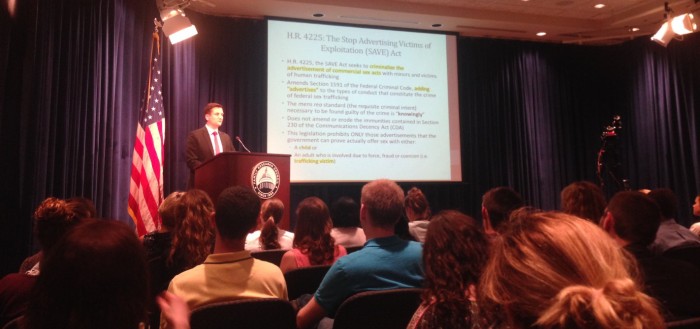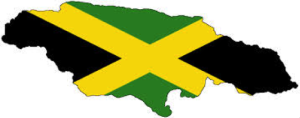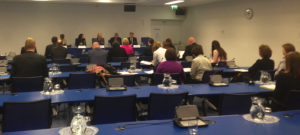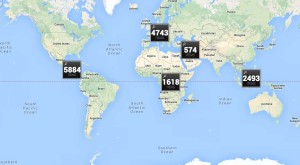By: Eion Oosterbaan
As its use becomes increasingly universal, the Internet has drastically changed the face of human sex trafficking. Through this medium, criminals have found a way to expand their reach of influence while simultaneously reducing the risk of their detection by law enforcement to a significant extent. Traffickers, or pimps, have taken their business operations from the streets to the online realm, openly advertising their victims as if they are items for sale on websites like Backpage.com and Craigslist. This new practice has caused the selling of human beings for sex to become enormously profitable as human sex trafficking now generates $9.5 billion yearly in the United States. With hundreds of potential buyers from all over the country viewing these ads daily, a trafficker can make anywhere from $150,000 – $200,000 per child victim in a given year.
 Even more surprising is the fact that websites earned a total of $45 million in revenue from prostitution advertising in the United States last year. In the average month Backpage.com receives $4-$5 million from these types of ads, which often involve underage children. Legitimate, legal, multimillion dollar corporations are currently profiting from criminal activity and the plight of trafficked children as they generally choose to ignore the fact that their services are facilitating these crimes. It should be noted that not every corporation has disregarded this issue, however, as Google has recently made a highly publicized decision to remove all pornographic ads and links to sexually explicit websites from their services.
Even more surprising is the fact that websites earned a total of $45 million in revenue from prostitution advertising in the United States last year. In the average month Backpage.com receives $4-$5 million from these types of ads, which often involve underage children. Legitimate, legal, multimillion dollar corporations are currently profiting from criminal activity and the plight of trafficked children as they generally choose to ignore the fact that their services are facilitating these crimes. It should be noted that not every corporation has disregarded this issue, however, as Google has recently made a highly publicized decision to remove all pornographic ads and links to sexually explicit websites from their services.
In order to limit the prevalence and profitability of human sex trafficking and to hold services like Backpage.com accountable, Congresswoman Ann Wagner and members of the Republican Task force on Human Trafficking in the 113th Congress have worked to create the Stop Advertising Victims of Exploitation Act (SAVE Act). The SAVE Act seeks to criminalize the advertisement of commercial sex acts with minors and victims of human trafficking by amending Section 1591 of the Federal Criminal Code to include “advertising” to the types of conduct that constitute the crime of federal sex trafficking. This act would effectively target the traffickers posting the ads in addition to the website organizations where the ads are posted. The bill has already passed through the House of Representatives with overwhelmingly bipartisan support, and has just recently been introduced in the Senate.
The SAVE Act directly coincides with Shared Hope International’s current activity in its fight to eradicate human trafficking. Shared Hope has taken a proactive approach to the issue of these illicit advertisements by using its resources to identify, track, and report instances of human trafficking activity on websites like Backpage.com. The criminalization of human trafficking advertisements would significantly increase the impact of this work. In addition, Shared Hope International’s Sex Trafficking Identification and Response Training would provide the necessary capacity to deal with these types of advertisements.
*Facts and statistics retrieved from the Family Research Council presentation on the SAVE Act at:
 By: Gunnar Simonsen
By: Gunnar Simonsen As a native of Jamaica, my anticipations of returning home are always filled with excitement and joy. I think of visiting family members, activities and events and the food. While this trip is filled with excitement and joy it is also filled with a bit of nervousness and fear. For the very first time, I will witness the effects of human trafficking on my island home of Jamaica.
As a native of Jamaica, my anticipations of returning home are always filled with excitement and joy. I think of visiting family members, activities and events and the food. While this trip is filled with excitement and joy it is also filled with a bit of nervousness and fear. For the very first time, I will witness the effects of human trafficking on my island home of Jamaica. I am very honored to join Shared Hope in Jamaica as we conduct a site visit to our Jamaician partners. I will be blogging while I am there so check back as I take this journey of an abnormal return home. Who knows, you just maybe offered a plate of ackee and saltfish (the national dish) and some festival similar to the picture on your right.
I am very honored to join Shared Hope in Jamaica as we conduct a site visit to our Jamaician partners. I will be blogging while I am there so check back as I take this journey of an abnormal return home. Who knows, you just maybe offered a plate of ackee and saltfish (the national dish) and some festival similar to the picture on your right. In attendance to speak as members of the discussion panel were Tejal Jesrani of the UNODC, Bjorn-Erik Ludvigsen of NCIS Norway, Andrew Oosterbaan of the USDOJ Child Exploitation and Obscenity Section, and Ethel Quayle of the University of Edinburgh.
In attendance to speak as members of the discussion panel were Tejal Jesrani of the UNODC, Bjorn-Erik Ludvigsen of NCIS Norway, Andrew Oosterbaan of the USDOJ Child Exploitation and Obscenity Section, and Ethel Quayle of the University of Edinburgh. In attendance were more than 70 people from over 15 countries representing government, law enforcement and non-governmental agencies. The purpose of this strategy meeting was to discuss the activities of the countries represented with respect to tracking the travel of TSOs from one country to another and notification of that travel to destination countries. It should be noted that it was accepted as a premise that the problem of TSOs is linked to the problem of human trafficking, particularly the trafficking and sexual abuse of children.
In attendance were more than 70 people from over 15 countries representing government, law enforcement and non-governmental agencies. The purpose of this strategy meeting was to discuss the activities of the countries represented with respect to tracking the travel of TSOs from one country to another and notification of that travel to destination countries. It should be noted that it was accepted as a premise that the problem of TSOs is linked to the problem of human trafficking, particularly the trafficking and sexual abuse of children.





